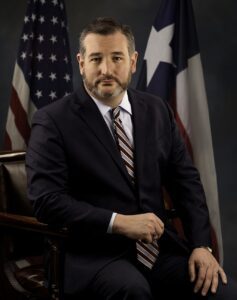 WASHINGTON, D.C. – In his opening statement at today’s Senate Commerce Committee hearing titled “FAA Organization Designation Authorization (ODA) Expert Panel Report,” Ranking Member Ted Cruz (R-Texas) discussed the important work carried out by the FAA’s ODA program and how the recommendations from an independent expert panel can work to improve aviation safety. Sen. Cruz also reiterated that the Commerce Committee needs to hear from both the FAA and Boeing regarding recent incidents such as Alaska Airlines flight 1282.
WASHINGTON, D.C. – In his opening statement at today’s Senate Commerce Committee hearing titled “FAA Organization Designation Authorization (ODA) Expert Panel Report,” Ranking Member Ted Cruz (R-Texas) discussed the important work carried out by the FAA’s ODA program and how the recommendations from an independent expert panel can work to improve aviation safety. Sen. Cruz also reiterated that the Commerce Committee needs to hear from both the FAA and Boeing regarding recent incidents such as Alaska Airlines flight 1282.
Here are Sen. Cruz’s remarks as prepared for delivery:
“The United States sets the benchmark for flight safety. And, by arguably the most important measure, 2023 was a remarkably safe year for aviation, with no fatal accidents or hull losses for commercial jet aircraft. Flying commercial remains the safest way to travel. But, understandably, recent incidents have left the flying public worried. The perception is things are getting worse. The public wants the Federal Aviation Administration and Congress to confront perceived risks in order to restore confidence for flyers.
“That brings me to the topic of today’s hearing: the FAA’s Organization Designation Authorization program. ODA is critical to the future of aviation safety, as well as American competitiveness. I appreciate the work of our congressionally appointed expert panel, which reviewed Boeing’s ODA for transport airplanes. Congress established this panel in the aftermath of the tragic crashes of Lion Air Flight 610 in 2018 and Ethiopian Airlines Flight 302 in 2019, in which 346 people tragically died.
“The panel’s final report was released in February, and three of its members are with us today. Welcome. As a brief aside, I would like to acknowledge that one of our witnesses, Dr. Javier de Luis, lost his sister on flight 302. Dr. de Luis, please accept my sincere condolences.
“Discussing ODA and what changes may be needed is critical, and I welcome this conversation. It is worth noting, however, that the FAA is still implementing the Aircraft Certification Safety and Accountability Act, this committee’s response to the MAX 8 crashes. It has not even fully implemented the 2018 FAA Authorization Act, even as we are currently negotiating the current reauthorization. While it is clear Boeing’s culture and safety management need drastic improvement, we should not rush to legislate just for the sake of legislating.
“To that point, I look forward to engaging with today’s witnesses, all of whom deserve our appreciation and thanks for their hard work on this effort. Their report was a consensus product, issued without any dissenting views—which all of us in Congress can appreciate is no small accomplishment—and I hope to better understand their recommendations and how Congress can work to improve aviation safety in a targeted and effective manner.
“While discussing ODA and Boeing’s safety culture is important, the flying public is much more worried about why pieces of Boeing airplanes are falling from the sky. The Expert Panel’s report specifically noted that the panel was not directed to investigate or provide recommendations toward ‘specific airplane incident[s] or accident[s], which occurred prior to or during the Expert Panel’s work.’
“In addition to today’s hearing, I believe we also need to hear from the FAA and Boeing itself about episodes like Alaska Airlines flight 1282. Our committee needs to understand not only Boeing’s ODAs but the specific production missteps that caused the January incident—and we need to hear from Boeing directly about the company’s safety culture and safety management writ-large. The public will want to know what changes Boeing is making to restore confidence in its brand. This is a great American company, and we want them to be successful, but when accountability is needed, as it clearly is here, we should not hesitate to demand answers.”

